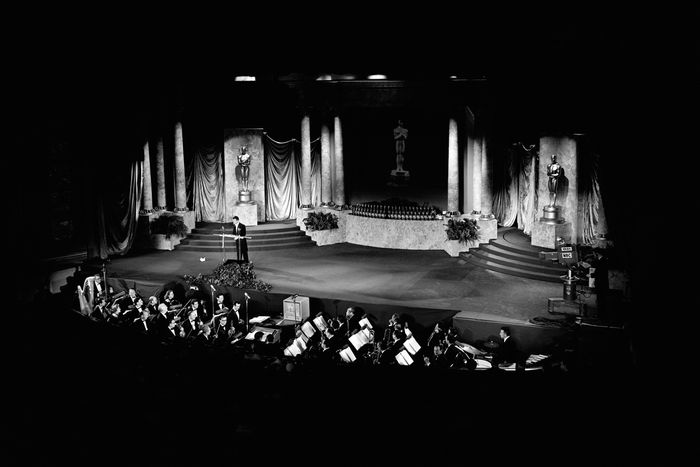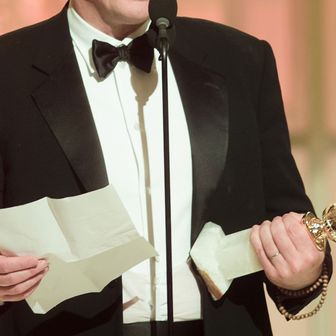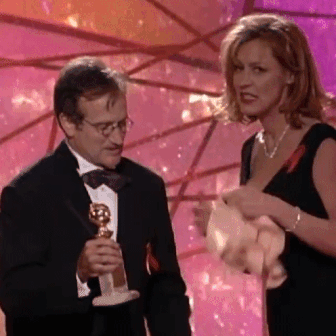
When Michelle Yeoh and Naomi Watts presented a Golden Globe on Sunday, they threatened violence against “whoever’s in charge of playing the music out there” should the winner get serenaded off the stage mid-speech. Yeoh was speaking from personal experience: Last year, a piano started to plink about two minutes into her Everything Everywhere All at Once thank-yous, to which she issued a swift “Shut up, please!” No one at this year’s Globes ended up evicted by way of orchestra, fortunately. But the proverbial play-off has become an awards-show terror.
Like the Motion Picture Academy, awards shows are both an art and a science. Celebrating creativity comes with its own math formula, split into hourlong broadcast chunks that rarely go according to plan. If Patricia Arquette wants a few extra seconds to champion women’s rights at the Oscars or Jennifer Coolidge needs to talk about feeling bloated because she took a lavender bath before attending the Emmys, it falls to the show’s director and producers to figure out how to make up for lost time. Play-off music isn’t the only method, but it is the one most familiar to anyone who watches Hollywood’s televised galas.
“People think it’s the guy with the baton who’s making that call, and I assure you it’s not,” Bill Ross, the conductor of multiple Academy Award orchestras, told NPR in 2012. Most music heard on an awards show is first cued by the director, usually stationed in a truck outside the venue. No one wants to play a winner off the stage. “I felt so terrible so many times,” says Don Mischer, a veteran of the Oscars, Emmys, and Tonys. “It is one of the most important moments of their lives. It’s something they’ll tell their grandkids about.” The director, having spent as many as four months preparing for the big night, might dispatch someone during a commercial break to beg the attendees to shorten their speeches or move to the stage more quickly. Other times, they’ll shave odds and ends off the program. But sometimes, they just have to ask the guy with the baton to stop Michael Moore from running overtime in order to excoriate George W. Bush.
Should you find yourself at the helm of an awards show, Vulture has a how-to guide for playing off rambling winners.
1. Be the audience.
Awards shows have a myriad of stakeholders: the nominees, the studios and networks backing them, the advertisers, the bartenders on hand to keep things interesting. But everything that unfolds must serve the viewer, without whom there would be nothing. “My approach to the show is putting myself in the fifth-row center and showing the audience at home what they would see if they were sitting right there,” says Jeff Margolis.
Dick Clark first recruited Margolis, who had a background in variety series and celebrity TV specials, to direct the 1982 American Music Awards. Through the mid-2010s, Margolis oversaw various Academy Award, Emmy (prime time and daytime), Screen Actors Guild, and TV Land Award telecasts. The Oscars, of course, was particularly notorious for running long. There’s only so much directors can do to curb the bloat — more on that next — but they can enforce a balance between indulgence and efficiency. “My job is to make everybody look good,” Margolis says. The problem? Not everybody is mindful of the ticking clock. For every Merritt Wever, there’s a Cuba Gooding Jr.
2. “Every second counts.”
The team running the show budgets for time forfeited to protracted speeches and minor mishaps, but it’s never an exact discipline. If the host’s monologue runs over or an unexpected standing ovation eats up some of the first hour, the director tries to make up for the lapse in the second hour. That could mean nixing the announcer’s teases or positioning the next presenters so they won’t have to walk across the stage after the commercial break. Certain categories will opt for shorter nomination packages that excise clips. Margolis, whose book We’re Live in 5: My Extraordinary Life in Television comes out in February, calls these “insurance policies.” Trim 10 seconds here and 15 seconds there, and before you know it, you’re back on track, hopefully. “Every second counts,” he says.
The next course of action: weaponizing the orchestra. The director wears a headset so they can communicate with the producers, camera crew, stagehands, and, crucially, the conductor. When speeches exceed their allotted 45 seconds, the director might instruct the conductor to cue the play-off score. “As soon as somebody gets up to the mic and starts reading off a piece of paper, you know you’re in trouble,” Margolis half-jokes. Even worse? When there are multiple winners — say, for Best Sound at the Oscars or Outstanding Writing for a Variety Series at the Emmys — and they neglect to appoint a sole spokesperson.
In the Globes’ case, there actually isn’t a live ensemble, largely because the Beverly Hilton ballroom doesn’t have room for one. Geoff Stradling has worked on the Globes since 1993, serving for the past several years as musical director. He pre-records the music with a band and queues the tracks in a playback system. Among hundreds of pieces prepared for the show, Stradling had five compositions ready to go if speeches ran long: four options from previous years and a new tune he wrote, cheekily titled “Cap’n Hook.” That’s the one he planned to use, but the Globes let all of Sunday’s winners gush in full.
Timekeeping isn’t only about getting off the air on schedule. Another reason to watch the clock: ratings. As the night wears on, viewership dwindles, particularly on the East Coast, where awards shows sometimes conclude at 11 p.m. or later. But the biggest reason is keeping advertisers happy. If a brand pays for a commercial to air in the second hour and that commercial gets bumped to the third hour because Joaquin Phoenix talked too long about climate change, the network airing the show risks having to refund some of its revenue, according to Margolis.
3. Let Al Pacino talk.
Of course, some people are impervious to restraint. “You’re less likely to play off George Clooney or someone who’s known to America,” says Mischer, who recently published the book 10 Seconds to Air: My Life in the Director’s Chair. Julia Roberts got her wish when she told “stickman” Bill Conti, then the Oscars’ long-serving conductor, “Why don’t you sit, ’cause I may never be here again.” When 1992’s Scent of a Woman earned Al Pacino a long-overdue Oscar after seven other nominations, he spoke uninterrupted for nearly four minutes. A good director, Margolis says, is lenient when it comes to historic victories.
Margolis put that lesson to the test in 1996 when the Holocaust portrait One Survivor Remembers won the Oscar for Best Documentary Short Subject. Director Kary Antholis spoke for just under a minute, at which point the orchestra began to play. But standing next to him was Gerda Weissmann Klein, the lauded Holocaust survivor who was the subject of Antholis’s movie. When Margolis realized she was also about to speak, he ordered the music to stop. He says it was one of the best decisions of his career, no matter how much time Klein’s words drained. “There wasn’t a dry eye anywhere,” Margolis recalls. “There are some times when you just have to break all the rules and do what you feel is right.”
4. Start soft.
Usually the play-off music begins with a gentle “tinkle,” Mischer says. Think of it as a warning: Hey, time’s up; please move along. If someone doesn’t take the hint, the orchestra will gradually crescendo. “We never get to the end of the piece because the director has made a call — either to push the music louder, cut away with the camera and go to commercial, or stop the music and let them talk,” Stradling says.
Awards shows’ musical directors can select that year’s GTFO song or compose their own, like Bill Ross did in 2007 when he wrote a piece called “Too Long.” In other years, maestros may choose something saucy, like in 2013 when the visual-effects team from Life of Pi was given a farewell and adieu at the Oscars via the menacing Jaws theme.
5. Beware of annoyed celebrities.
“Shut that crap off,” Bette Midler hollered to the intervening orchestra while rattling off thank-yous at the 2017 Tonys. “They cut me off before I got to thank my wife,” Sterling K. Brown told reporters backstage when the Emmys silenced his microphone that same year.
Every year, someone’s bound to walk away perturbed. It’s fine! The director is far enough from the action that they are unlikely to receive the brunt of any anger. If anyone should worry about getting caught in a celebrity’s crosshairs, it’s the stage manager, one of the first people winners encounter after sauntering away from the podium. Margolis can recall at least one A-lister who took out their frustration in the wings, but he won’t name names. “They went offstage and started screaming, ‘Why the fuck did you start the music?’” he says.
Mostly, though, everyone gets it. People can always dance their troubles away at the after-parties. “You do the best you can do,” Mischer assures. “You make the best decisions possible in the spur of the moment.”
More From This Series
- Can You Lose an Oscar With a Bad Acceptance Speech?
- Christine Lahti on That Time She Was in the Bathroom When She Won a Golden Globe
- The 50 Greatest Awards-Show Speeches of the Last 55 Years





